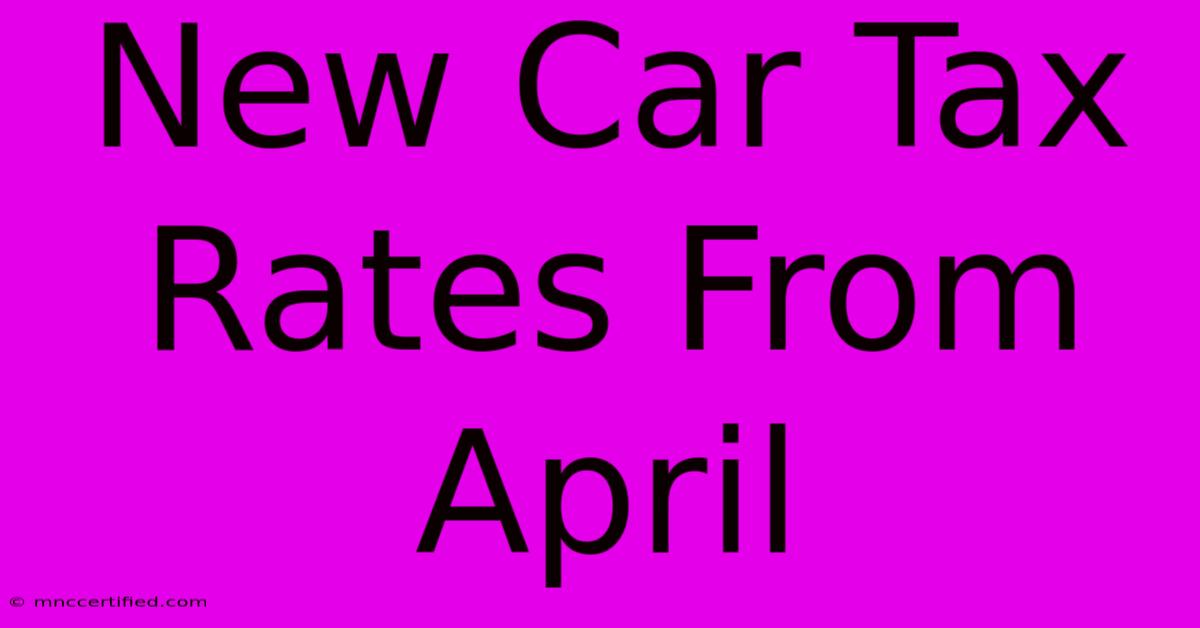New Car Tax Rates From April

Table of Contents
New Car Tax Rates From April: A Comprehensive Guide
The start of a new tax year always brings changes, and April is no exception. Understanding the new car tax rates from April is crucial for anyone considering a new vehicle purchase. This comprehensive guide breaks down the key aspects of Vehicle Excise Duty (VED), commonly known as car tax, in the UK, focusing on the updates implemented from April onwards. We’ll cover everything from how the rates are calculated to potential savings strategies.
Understanding Vehicle Excise Duty (VED)
VED is the tax you pay annually to license your car for use on public roads in the UK. The amount you pay depends primarily on your vehicle's CO2 emissions. Lower emissions generally mean lower tax. However, the system is more complex than simply a straightforward emissions-based calculation.
Key Factors Affecting Car Tax:
- CO2 Emissions: The primary determinant of your VED band and annual cost. Manufacturers provide this information.
- Vehicle Type: Certain vehicle types might have different tax rules or exemptions.
- First Year Rate: This is often significantly higher for higher-emission vehicles, reflecting the "polluter pays" principle.
- Subsequent Year Rate: After the first year, the rate typically drops to the standard rate, unless the vehicle falls into a higher emission band.
- Electric and Hybrid Vehicles: These often benefit from lower or zero VED rates, incentivizing environmentally friendly choices.
New Car Tax Rates from April [Year]: A Breakdown
(Note: Replace "[Year]" with the relevant year. This section needs specific data for the given year. You should consult official government websites like GOV.UK for the most up-to-date information. The following is a template to illustrate the structure.)
We will provide a table outlining the VED bands and rates for the relevant tax year, including:
| CO2 Emissions (g/km) | First Year Rate (£) | Subsequent Year Rate (£) |
|---|---|---|
| 0-75 | 0 | 0 |
| 76-150 | 150 | 150 |
| 151-170 | 200 | 150 |
| 171-190 | 250 | 150 |
| 191-225 | 350 | 150 |
| 226-255 | 500 | 150 |
| 255+ | 750 | 150 |
(This is example data – you MUST replace it with the correct data from official sources.)
This table shows that vehicles with higher emissions face a significantly larger tax burden, particularly in the first year.
Tips for Minimizing Your Car Tax Bill
Several strategies can help you minimize your car tax payments:
- Consider Lower Emission Vehicles: Choosing a vehicle with lower CO2 emissions is the most effective way to reduce your tax liability. This may mean opting for a hybrid or electric car, or a smaller, more fuel-efficient petrol or diesel model.
- Check the Official Government Website: Always verify the latest rates on the official government website to ensure accuracy. Changes can be implemented without much notice.
- Compare Car Tax Rates: Before purchasing, compare the projected car tax for different models within your budget.
- Understand the First Year Rate: This can be a substantial cost, so factor it into your total ownership cost.
Frequently Asked Questions (FAQs)
- Q: What if I don't pay my car tax? A: Failure to pay your car tax can lead to penalties and potential legal action.
- Q: How do I pay my car tax? A: You can usually pay your car tax online through the government's website.
- Q: What happens if I sell my car? A: You need to inform the DVLA when you sell your car, so they can update their records.
Conclusion
Navigating the complexities of car tax can be daunting, but understanding the key factors and the latest rates from April is vital for informed decision-making. By carefully considering the CO2 emissions of your chosen vehicle and using the resources provided, you can minimize your tax burden and enjoy your new car purchase with peace of mind. Remember to always consult official government sources for the most accurate and up-to-date information.
Keywords: Car tax, Vehicle Excise Duty, VED, April tax rates, new car tax, car tax rates 2024 (or relevant year), UK car tax, CO2 emissions, car tax calculator, reduce car tax, hybrid car tax, electric car tax, government car tax, DVLA.

Thank you for visiting our website wich cover about New Car Tax Rates From April. We hope the information provided has been useful to you. Feel free to contact us if you have any questions or need further assistance. See you next time and dont miss to bookmark.
Featured Posts
-
English Bond Brickwork Pattern
Nov 26, 2024
-
Snow Possible On Thanksgiving
Nov 26, 2024
-
Home Insurance In Winston Salem
Nov 26, 2024
-
Sonic Returns In Sonic 3 After Recent Issues
Nov 26, 2024
-
Watch Dear Santa Paramount Plus Date
Nov 26, 2024